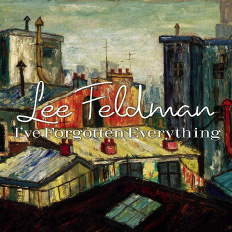“Lee Feldmans Ive Forgotten Everything is unlike anything else in contemporary pop… If you have a passion for good songwriting, you need this album.”
We couldn’t have said it better ourselves!
“I’ve Forgotten Everything” REVIEW
STEREOPHILE
September 2006, by Art Dudley
Then theres Lee Feldman, a classically trained pop musician who brings a strong if decidedly off-center sense of melody to the art of traditional American songwriting, and whose lyrics betray a poetic sensibility in tune with the best of the 20th century Americans (especially Theodore Roethke, whose My Papas Waltz could easily hide on one of Feldmans albums). All of which is to say that Lee Feldman is unclassifiable. Michael Fremer turned me on to Feldmans music when he wrote about it for Listener back in the early days of 2001, and my fondness for the Brooklyn-based singer-songwriter has since grown steadily. His third album, Ive Forgotten Everything (Urban Myth UM-114-2), has just been released, and its already an indispensable part of my pop-music collection. Almost half of the albums songs discuss aging or abandonment not in a maudlin or self-pitying way, but impressionistically, with carefully chosen images and scraps of monologue. In Me and My Sara Remaining, an elderly man talks about his changing neighborhood with a mixture of fear and resignation; in his plaintive, unaffected style, Feldman sings the opening line And all of the places are changing against a continually changing string of chords that never quite resolve, yet that support a strangely sad melody. And in Give Me My Money, the albums thematic center, the narrator focuses his motley thoughts just long enough to express his frustration as something tangible:
Give me my money
Im a human being
I used to write music that people could sing
Give me my footsteps
Where did they go?
I wish I had known that I needed them so
Some of the tunes on Ive Forgotten Everything meander in a happy, child-like way such as the upbeat Big Women on the Shelves, the albums happiest and most triumphant moment. Others are more serious-minded, such as the stark setting for a creepy-funny lyric titled Cave. That one opens with a solo trumpet playing a series of descending intervals, then switches to an ascending series of mildly dissonant chords led by a solo cello: Its almost Schmidts Symphony 4 in miniature. The simplest melody of all is reserved for the closing number, See You Again yet even then, the leitmotif of aging returns, as the final lines are sung by the Northside Senior Center Chorus. From Brooklyn, of course.
Lee Feldmans Ive Forgotten Everything is unlike anything else in contemporary pop. The songs are alternately sad, whimsical, harrowing, and very funny (although the albums best laugh may be the visual joke on the disc itself). A third of the tunes are waltzes, and all of the melodies are catchy and challenging in more or less equal measure. Above all, the writing voice behind it all is kind, humane, and clever without being too clever: Theres nothing arch about Feldmans music. Every one of these songs is like a smile you cant read, yet that pulls you along in spite of yourself. Lee Feldman is one of the few musicians in contemporary pop whom I think of an artist, and Ive Forgotten Everything is far and away his best work so far. If you have a passion for good songwriting, you need this album.

